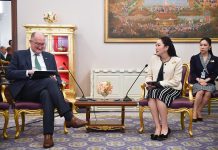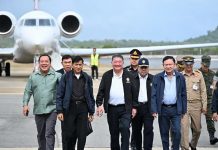BANGKOK-Some progress has been made on peace dialogues that are expected to reduce the severity of violent incidents and bring about lasting peace in the southern border provinces.
Spokesman of the Internal Security Operations Command Major General Banpot Poonpian quoted Chief of the Peace Dialogue Panel General Aksara Kerdphol as saying that confidence-building and safety zones are among major points in the peace dialogues. These points are a focus of attention among various sectors of Thai society.
Major General Banpot said that Prime Minister General Prayut Chan-o-cha, in his capacity as Chairman of the Steering Committee for Peace Dialogue had set three phases for the process of peace dialogues. The first phase involves confidence building. The second phase seeks to sign ratification for peace-building. In the third phase, consensus will be reached for the end of conflicts through peaceful means. Then a roadmap will be worked out for lasting peace.
He said that the first phase is considered the most difficult task in the peace talks with “groups holding different views and ideologies to that of the state.” The expected outcome of this stage is the scale of violence will be limited. Informal talks have been held recently, with an emphasis on the exchange of views with various sectors in the country.
Other issues in the talks include designating representatives from each side for the peace dialogues and the listing of problems and frustration of various groups. In the latest developments, a Joint Technical Team has been formed to set rules for the process of the dialogues. Several meetings have been held through the facilitator on this issue. The Joint Technical Team will report results of their talks to the decision-making level of each side.
With regard to the designation of safety zones, the topic will be submitted to the next step of peace dialogues. In recent years, efforts have been made on the issue of safety zones. During this round of peace dialogues, both sides will ensure that violence will not take place in the designated safety zones. The objective is to reduce violence in certain areas first.
In addition, the safety zones must be clearly defined, in respect of international practices. They must also be prepared as a way of confidence-building. Another important factor is that the public sector and the groups holding different views and ideologies to that of the state must accept the views of local residents, as well as their culture. The voices of local people, especially those who have suffered losses of lives and property because of unrest, must be thoroughly recognized.
The Peace Dialogue Panel believes that the southern situation in 2016 will improve to the point that it will no longer be a worrisome issue, in response to the expectations of local people. The panel will encourage relevant groups to participate in the peace dialogues and refuse all forms of violence. The ultimate goal is to bring about sustainable peace. As for measures to maintain peace and security, the Internal Security Operations Command (ISOC) Region 4 Forward, as the Area-based Inter-agency Coordination Working Group, will be responsible for preventing any groups from creating new negative conditions for perpetrators of violence to take advantage of.
At the same time, it will create an atmosphere conducive to the process of peace talks, which will continue with a strong intention to stop violence and bring lasting peace to the southern border provinces.




